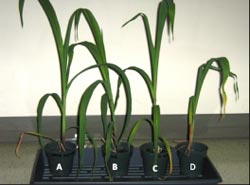Bacteria Can "Fertilize" Copper-Polluted Soil

Maize grown in soil with copper and bacteria (C) appears as vigorous as the control plant (B).
Now, however, Ramakrishna Wusirika’s research team may have discovered how to make plants grow in the mine-waste desert and soak up some copper while they are at it.
Wusirika, a biological sciences professor at Michigan Technological University, began his research using several species of Pseudomonas bacteria from the sediments of Torch Lake. In the region’s copper-mining heyday, the lake was used as a dump for mine waste. “We found bacteria that are resistant to high levels of copper,” he said. “We thought we might be able to use them to help plants grow better on contaminated soils.”
So Wusirika’s research team added copper to soil samples and then inoculated them with a copper-resistant strain of Pseudomonas. Finally, they planted the samples with maize and sunflower seeds and waited.
As expected, seeds planted in copper-free soil thrived, and seeds planted in the copper-tainted soil without bacteria were stunted. But seeds planted in the coppery soil enriched with bacteria did much better; some were nearly as vigorous as plants grown without the toxic metal.
“The bacteria seem to help with plant growth, and they also help maize and sunflower uptake copper,” said Wusirika. That means some kinds of naturally occurring bacteria could make soil more fertile and, in concert with the plants, remove at least some of the copper, a process known as rhizoremediation.
Their work, coauthored by PhD student Kefeng Li and Wusirika, was published online March 1 in the Journal of Hazardous Materials. For their next project, Wusirika’s team has been testing how well their technique might work in a real copper-mining desert. They are in the process of using these bacteria to promote plant growth in stamp sands collected near the small Upper Peninsula village of Gay, where the copper-processing byproduct covers about 500 acres.
Ramakrishna Wusirika, 906-487-3068
Media Contact
More Information:
http://www.mtu.edu/news/All latest news from the category: Agricultural and Forestry Science
Newest articles

First-ever combined heart pump and pig kidney transplant
…gives new hope to patient with terminal illness. Surgeons at NYU Langone Health performed the first-ever combined mechanical heart pump and gene-edited pig kidney transplant surgery in a 54-year-old woman…

Biophysics: Testing how well biomarkers work
LMU researchers have developed a method to determine how reliably target proteins can be labeled using super-resolution fluorescence microscopy. Modern microscopy techniques make it possible to examine the inner workings…

Making diamonds at ambient pressure
Scientists develop novel liquid metal alloy system to synthesize diamond under moderate conditions. Did you know that 99% of synthetic diamonds are currently produced using high-pressure and high-temperature (HPHT) methods?[2]…





















